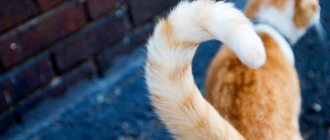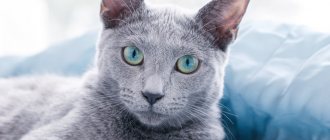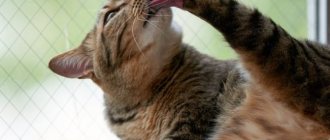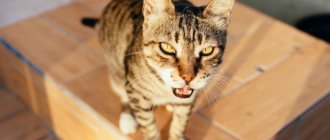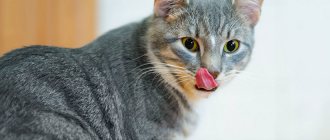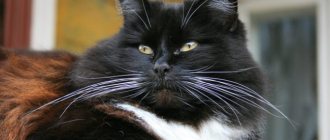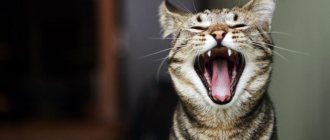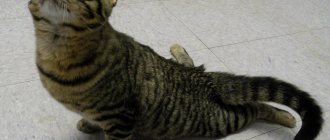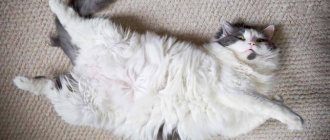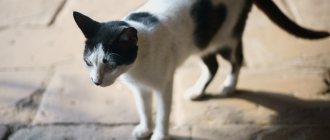Reasons for washing your cat frequently
According to felinologists, cats spend about a third of their lives in a state of licking. And there can be many reasons for this. Let's look at the main ones.
Hygiene
Cats are indeed very clean animals. They lick themselves after sleeping, going to the toilet, walking, or communicating with their owners. Moreover, the licking process is usually accompanied by biting something - this is how cats cleanse the skin of various impurities.
Combing
Cats have a hard and rough tongue, which allows them to tidy up their fur. Moreover, in the process of washing, cats not only comb themselves, but also remove dead hairs.
Attention! When washing, representatives of the cat family lick the fallen hairs, which is accompanied by their settling in the stomach with the formation of lumps. In order to avoid problems with the gastrointestinal tract, pets should be given grass or a special paste sold in pet stores.
Preparing for the hunt
Cats by nature are born hunters. For a hunt to be productive, the animal must attract as little attention as possible. Licking in this case allows the cats to hide their own odors.
Interesting. Cats groom themselves much longer and more thoroughly than males.
Thermoregulation
Cats lick themselves especially actively in hot or cold weather. In the first case, the fur fluffs up after licking, and the penetration between the hairs cools and protects the skin. In the second, the hairs create a dense “carpet” that protects against hypothermia.
Be sure to read:
How to scare cats away so that they don’t shit, mark and damage furniture, what smell they can’t stand
Moisture protection
Moistening the fur with the tongue not only triggers thermoregulation processes, but also contributes to the formation of a water-repellent coating on the fur. At the base of the cat's hair there are glands that produce an oily secretion - sebum. Licking leads to an even distribution of secretions and the formation of a protective layer on the fur.
Communication
Licking is also one of the means of communication that allows cats to show affection towards their fellow cats. This ritual allows not only to clean fur in hard-to-reach places, but also to exchange scents and demonstrate attention and affection.
Relaxation
When licking, cats apply pressure with their tongue to certain points on their body. This action relaxes, reduces muscle tone, and relieves the effects of stress and fear. That is why, some time after the fright, cats begin to wash themselves thoroughly.
A pet may lick its fur for a number of reasons.
Normal hygiene
Cats lick themselves to stay healthy and feel good. This allows you to get rid of fallen hairs, dirt, and small debris. Washing is performed after eating, sleeping, visiting the litter box, contact with humans and other animals. Often, in this way, pets gnaw out small parasites that humans do not notice.
When heavily infested with parasites, cats wash themselves more actively and lick themselves more often. They become irritable and may bite and scratch themselves until they bleed.
Combing the fur
The matted fur straightens out under the influence of roughness on the tongue. Hairs licked during the procedure enter the gastrointestinal tract, which can lead to complications in the digestive system.
Preparing for the hunt
After contact with other animals or people, cats smell someone else's scent. To get rid of it, the pet licks itself. At the same time, special fluids get onto the fur with saliva. Cats groom themselves more thoroughly than males, since they are the main breadwinners in prides and are more effective as hunters.
In extreme heat or cold, cats lick themselves more actively. In summer, the animal uses its tongue to fluff up the hairs, moisturize them, which helps cool the skin. In winter, cats lick their fur more tightly so that the fur provides better protection from adverse weather conditions.
Moisture protection
By licking, cats distribute the secretion of the sebaceous glands evenly throughout the body. This creates a water-repellent layer. Some breeds have this ability so developed that they can swim, fish and not get wet.
Method of communication
Cats can also clean other members of their species with their tongues. By licking their fellow cats, cats help them get to hard-to-reach areas. Such a manifestation of care simultaneously indicates the presence of attachment to another animal. During the rut, cats lick their cats, marking them in this way. Females lick newborn kittens both for hygienic purposes and as an expression of love.
We suggest you read: The cat is constantly itching and licking himself why this happens if there are no fleas what to do how to treat
Stress
During times of stress, cats need to relax tense muscles. Since during licking they exert considerable pressure on the body with their tongue, this helps to relax. Frightened, irritated animals often achieve calmness in this way. Sometimes, however, such a habit becomes obsessive and neurotic. A cat can lick its fur for a long time until bald patches form.
Many of you have noticed that cats are perhaps the only animals that are ready to devote all their free time from sleep and active play to preening. There is no single answer to why cats wash themselves frequently. The cleanliness inherent in nature has several foundations.
Genetic memory
The first and key reason is the instinct received by domesticated pets from their wild ancestors. All cats are by nature predators who, in the hunt for prey, are ready to sit motionless for hours, lurking in ambush. And so that the potential victim does not hear the smell of the predator, cats lick their fur coat every half hour.
For the same reason, cats always wash their faces with their paws after eating. Indeed, in the wild, after a meal, the faces of predators are often stained with the blood of their victims.
A cat's tongue has a rough surface. Due to this, during the grooming process, dead hairs, cells and other organic residues are easily removed from the fur.
Personal hygiene
Cats are big clean people. They are not tolerant of foreign odors. This is especially evident when, after people stroke them, cats begin to intensively lick the place of contact. This way they solve two problems at once: they put the fur coat in order and at the same time get rid of foreign odors.
Meeting the natural needs of cats also always ends with the ritual of washing. They carefully clean themselves with their tongue, helping with their front paws, trying to remove all stuck dirt from their fur.
Cats spend the most time washing themselves in the autumn-spring period, when the molting process is in full swing. With a rough tongue, they help remove dead hair from the body.
It is noteworthy that cats wash themselves much less often than cats. The explanation for this is more pronounced laziness and even a certain sloppiness.
Body thermoregulation
One of the main reasons why cats wash themselves so often is the need to form a moisture-repellent layer on their fur, which will support the process of thermoregulation.
Frequent licking activates the glands located at the base of the hair follicles, which produce sebum. This oil secretion creates a moisture-repellent barrier that perfectly protects the skin from moisture and temperature fluctuations in the external environment.
In the winter, washing helps animals warm up, and in the summer months it helps to increase the space between the hairs, opening up a fresh flow of air to the heated skin.
Self-soothing
The desire to urgently put themselves in order in animals also occurs during moments of stress. Most often this happens when changing place of residence or adding a new household member.
The effect of leisurely licking is comparable to that of a relaxing massage. When an animal is nervous, its body temperature rises. Moistening the fur coat with your tongue helps bring it back to normal.
Showing you care
Almost all cats get along well with other pets, including dogs. By licking their fellow tribesmen and “neighbors,” cats express affection and love. This is a unique form of communication.
Mutual licking between cats that live in the same house is a clear indicator of a happy relationship. Moreover, during mutual washing, cats usually treat the most inaccessible places - the neck and head.
As for a cat licking its cubs, such water procedures are carried out not only for hygienic reasons. By running their rough tongue along the body, they activate receptors, stimulate breathing and normalize blood circulation. The mother's licking of the anogenital area of her babies stimulates the processes of defecation and urination in their bodies.
In addition, cat saliva contains components that have an antiseptic effect. Treating newborns with saliva promotes rapid healing of their birth tears.
How to train a cat not to be afraid of water?
Of course, after such an emotional event, some owners completely lose the desire to wash their pet, while others set themselves the goal of getting him used to washing. Is it possible to do this? Yes. Of course, kittens learn best, but an adult animal will also get used to water procedures over time.
The first condition is regularity. However, it is recommended to wash a cat that does not cross the threshold of the house more than once every few months. In order for a cat to get used to washing, it is necessary to accustom it to the owner’s hands. To do this, you first need to accustom her to stroking (if she is afraid of being touched), then to combing (this is done with a special wide-toothed comb), and finally to wiping with a damp cloth. Of course, you should never scold your pet - he is very scared and feels in danger.
And yet, you shouldn’t get carried away with bathing domestic cats: they don’t need it. It is generally undesirable to wash very fluffy cats: their thick coat takes an extremely long time to dry, the cat is cold all this time and constantly licks itself. Thus, she can catch a cold and eat too much wool.
Didn't find what you were looking for? Use the site search form
Why does a cat need to wash itself?
In nature, wild cats have to hunt in various conditions, even in water. By licking themselves, they evenly distribute the sebaceous secretions of the body throughout the fur. This helps prevent the hide from getting too wet.
It has been noticed that females pay more attention to their own fur, licking it more often and more thoroughly. This is explained by the fact that in cats, the female is often the one who hunts for food. She has to feed the offspring, and in large representatives of the family, such as lions, females also provide food for males.
- The social aspect of tongue washing is also of great importance for cats. In the process of communication, animals lick and rub against each other. Thus, they partially transfer their own smell to another individual. In a world where the sense of smell is of great, sometimes even vital, importance, it helps to distinguish friends from enemies.
- If, when a conflict arises with its relatives, a cat suddenly sits down and begins to wash itself, this is a sign to others that he admits defeat and does not want to continue hostilities.
- By licking the kittens, the mother masks their scent, protecting them from other predators. Newly born kittens are not able to eliminate their own needs. With the help of a kind of tongue massage, the cat puts this mechanism into action.
We suggest you read: Why does a cat eat cabbage?
Cats keep their fur in order, as their health and well-being depend on it.
The cat's tongue is rough and quite hard, like a mini-brush. With its help, the animal literally combs out its fur, removing loose hairs, dirt, and straightening matted fur. Teeth and front paws are also used for hygiene procedures. To reach hard-to-reach places, the cat licks its paw and rubs its muzzle and the area behind the ears.
Licking the fur helps the animal maintain temperature balance. By fluffing and moistening the fur with its tongue, the cat creates a certain microclimate that allows it to feel comfortable in both heat and cold.
By the way a cat licks itself, one can judge the animal's mental state. The pet pays a lot of attention and time to this activity. This kind of massage, performed with a hard tongue, has a calming and relaxing effect. It has been noticed that after a stressful situation (moving, visiting a veterinarian, fright), cats take a long time to carefully clean themselves up.
The cat's sebaceous skin glands contain cholesterol, which is converted into vitamin D in the light. By licking the fur, the animal receives the substances necessary for the health of the body. An attentive owner will notice irregularities that arise in the daily washing ritual. If a cat licks and bites itself too often and intensely, this may indicate skin irritation, allergic reactions, fleas or ticks, or stress.
- If cats wash their tails and backs, you have to wait for the rain.
- Washing your nose and cheeks portends good weather, no clouds.
- If your pet rubs its face with both paws, you need to see in which direction it turns its head. A strong wind should blow from there after a while.
- If a cat washes its left ear, expect a girl to visit.
- When an animal washes its ear on the right side, you should expect a man to appear. You can touch the animal's paws at this time. If the limbs are warm, the guest will be a relative.
- Cold paws indicate an unexpected visitor.
When a cat refuses to wash: the reason
Their mother usually monitors the hygiene of little fluffies. The reason why a cat stops licking itself can be temporary. These conditions include:
- Post-traumatic complications after back injury. The cat washes itself, but cannot reach some areas of the body under the tail, the hind limbs.
- Obesity. Due to excess weight, the pet loses its flexibility, so it cannot reach its belly or tail.
- Wearing protective equipment. A collar, bandage or splint does not allow the cat to fully take care of itself, but after recovery the pet puts itself in order.
- Young age. The kitten is washed by the mother, since the baby does not yet know how to wash himself, but as he grows up he begins to lick himself.
But if the cat does not lick itself after using the toilet or completely refuses to wash itself, the owner should be alert to the following symptoms:
- Lack or decreased appetite.
- Dry and hot nose.
- Animals search for a dark place.
- Refusal to play or communicate with the owner.
- Vomiting or diarrhea.
If the cat stops licking itself
A pet can stop grooming its fur for several reasons. A similar phenomenon is possible when:
- excess body weight due to improper care of the cat;
- diseases of the musculoskeletal system;
- dental pathologies;
- prolonged stress.
If there are problems with the cat’s gums, teeth, or oral cavity, the pet may refuse to wash itself. Difficulties may appear in the initial stages of gingivitis and periodontal disease.
The area of gums near the diseased tooth becomes inflamed, red, and may become covered with ulcers. Any touch to the affected area becomes painful. Movements made with the tongue when washing also cause pain. Because of this, the cat prefers not to lick itself.
Other symptoms of such diseases are putrid breath, decreased appetite up to complete loss, irritability or apathy and lethargy.
Arthritis of the joints
With arthritis, a pet becomes less mobile, since any physical activity is accompanied by pain. Because of this, the frequency and effectiveness of washing gradually decreases.
The symptoms of arthritis depend on which part of the body is affected. If the pathological focus is localized in the front paws, it becomes difficult to maintain hygiene of the muzzle and areas behind the ears. When the lesion is localized on the hind legs, the pet, on the contrary, may lick the affected areas more vigorously.
This way it reduces the intensity of pain. At the same time, activity and curiosity decrease. The cat prefers to lie down, may avoid contact with people, and does not play. There is a general deterioration in condition.
Excess weight
If a cat is overweight, it becomes clumsy. Motor activity decreases. It becomes difficult to reach some parts of the body with the tongue. Because of this, the animal may refuse to wash itself and lick itself ineffectively.
We suggest you familiarize yourself with: Black widow spider? Photo, description, habitat, food, enemies ✔
The problem often occurs after castration or sterilization. To get rid of it, you will need to adjust your pet’s diet and switch it to proper nutrition. It is better to select a suitable diet with a veterinarian.
Sometimes refusal to carry out hygiene procedures can be caused by severe nervous tension. This happens especially often with young animals after a change of place of residence or owner. At the same time, the pet may refuse other usual actions, show no interest in water and food, and refuse to go to the litter box.
The depressed state rarely persists for long. A person can help a pet relax faster with affection and care.
Fear and stress can also cause the opposite reaction. If a cat begins to wash itself constantly, it will develop bald patches and wounds on the skin. In such a situation, you should go to the veterinarian to pick up sedatives and sedatives.
With severe infectious pathologies, the cat stops caring for its fur, which is why it becomes greasy, matted, and unkempt. At the same time, appetite decreases to the point of complete absence, interest in games disappears, lethargy and apathy develop. You need to immediately contact your veterinarian to find the right treatment.
Since it can be difficult to make a correct diagnosis on your own in the initial stages of the disease, choose the appropriate medications, and self-medication is not worth it.
Lack of therapy is also dangerous - it can lead to serious complications and death.
What to do if the cat does not wash itself?
If you specifically wet an animal with water, you can force it to take care of its hygiene.
When the cat is healthy, but does not want to wash its butt because of disgust, you can help it and wash the anus area with a cleansing shampoo. Or moisten the anus with a drop of vegetable oil. A foreign scent will cause the animal to lick itself to remove the foreign scent. To teach a kitten to wash itself, you should stroke it more often, imitating the touch of its mother. To force and train your pet to wash itself, in hot weather you can slightly moisten the fur with water. The presence of liquid on the fur coat is unpleasant for the pet and it will begin to lick itself intensively.
If the cat is temporarily unable to wash itself, the owner should use dry pet shampoo or foam - Trixie, Esprit, Vets Best, Frontline. The products effectively eliminate excess sebum and make the coat beautiful and well-groomed. After cleansing, the pet should be combed. If the animal is injured, sometimes it is enough to help and support the cat or a part of the body that he cannot reach, and the pet will wash itself. If the owner refuses to wash himself for more than 2-3 days, he should take his pet to the veterinarian, especially if there are other signs of deteriorating health.
Why do cats stop licking their fur?
Licking fur is a natural need for cats. Therefore, if you notice that the cat has stopped looking after itself, take a closer look at the animal. Refusal to undergo a regular procedure may indicate a number of ailments:
- inflammation of the gums or teeth;
- excess weight, which does not allow the animal to reach all parts of the body;
- arthritis of the joints, causing pain when changing body position;
- excessive stress, against the background of which the animal simply forgets about the regular procedure.
There are also opposite situations when cats begin to lick themselves too intensively. Such behavior, which is unusual for animals, may indicate that they have allergic reactions that cause discomfort, or that there are parasites in the body.
How a Bengal cat washes itself: video
Refusal to lick always indicates the presence of certain problems with the health or mental state of the cat. The animal looks unkempt and unkempt. Let's look at why pets may stop washing themselves.
Gingivitis or the initial stage of periodontal disease often lead to the cat refusing to lick. Inflamed, ulcerated gums in the area of the teeth cause severe pain when washing, which leads to a gradual abandonment of this habit.
For your information. Diseases of the gums and mouth are usually accompanied by a putrid odor from the mouth.
Arthritis
Any movement of the paws with arthritis causes joint pain. The animal tries to avoid painful sensations and, accordingly, tries to lick its fur coat as little as possible.
Obesity
Obesity is the scourge of castrated and sterilized animals. Improper nutrition leads to a sharp increase in body weight, and increased body weight makes domestic cats lazy and sluggish. Victims of excess weight wash themselves much less often than their lean counterparts.
Be sure to read:
A cat licks a person’s hands and face: 5 reasons what to do, why a cat constantly licks itself
Washing after eating
Speaking about signs, it is also worth mentioning a parable that explains why cats wash themselves after eating, and not before. It says that once a cat caught a sparrow, held it with its paws and was going to eat it. And the sparrow noticed that you should always wash your face before eating, and the cat should be ashamed that she didn’t wash her paws. She obeyed and released the sparrow to wash herself - the sparrow immediately flew away. Since then, cats always wash themselves only after eating.
But there is also a scientific explanation for why cats wash themselves after eating; they are predators, so it is important not to reveal themselves when hunting. For this reason, it is necessary to thoroughly brush the coat, paws and teeth to eliminate all food odors. Plus, a natural love for cleanliness also plays a role.
What is the reason?
Well, domestic Murks love to wash themselves no less than their wild counterparts. Why does a cat need to wash itself, although there is no need for it at all? This is because the main purpose of the ritual is to eliminate odor. With the help of strong, sharp fangs, cats catch their prey, but first they need to track it down. Hunting from an ambush, in the complete absence of smell, which is a kind of camouflage, the cat keeps watch over the prey, while remaining unnoticed for a long time. After all, most victims have a very well developed sense of smell. Dogs also hunt, masking their scent, but their main task is to drive the prey. Therefore, hunting dogs prefer to lie out in foul-smelling places rather than lick themselves for a long time.
What cat breeds love water?
However, not all cats panic at the sight of water. Some of them enjoy playing with a trickle of water or splashing water from a filled basin (bucket). And representatives of several breeds absolutely adore water. These are the native breeds Turkish Van and Kurilian Bobtail, as well as the Bengal cat. They will only be happy with water procedures! Norwegian forest cats, Maine Coons and American Bobtails are quite favorable towards water. Sphynxes also love to swim, perhaps because they are accustomed to water procedures from childhood.
Animal communication and stress relief
Now you know the main reasons why cats wash themselves often. But animals often lick each other. What is this connected with? Typically, pets express their friendliness towards other animals in this way. This is their form of communication. If there are several cats living in a house and they like to lick each other, then this indicates their friendly relationship.
Washing evokes positive emotions in animals. This helps them relieve stress. You may notice that cats often lick themselves when separated from their owner. Intense washing may be noticed when a pet changes homes or when the pet is scared or angry.
Licking helps hide scent from other predators
A cat's sense of smell is fourteen times stronger than a human's. Most predators track prey by smell. In the wild, a mother cat will always try to hide her little kittens by hiding evidence of their feeding. A caring mother will carefully lick herself and her cubs after each feeding. For the same reason, in the wild, cats bury dead prey left over from a meal. You can observe a similar instinctive behavior in a pet when you see a cat scratching the floor around the saucer after eating.
